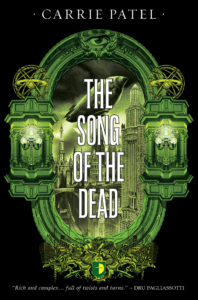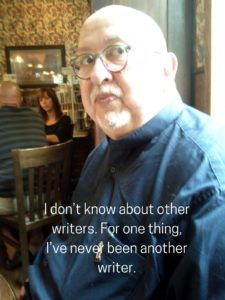 Growing up, two of my favorite things were books and video games. If you’d told me twenty years ago that I’d grow up to write both, I probably would have choked on my Mountain Dew.
Growing up, two of my favorite things were books and video games. If you’d told me twenty years ago that I’d grow up to write both, I probably would have choked on my Mountain Dew.
But over the past few years, I’ve been doing exactly that. I’ve written the Recoletta series, a science fantasy trilogy published by Angry Robot, and I’ve worked as a narrative designer at Obsidian Entertainment for three and a half years now, writing for the Pillars of Eternity games and expansions.
In both media, the principles of good storytelling””establishing a strong story arc; building a vivid, believable world; and populating it with complex, memorable characters””are the same.
But the user experience differs, and understanding that is key to knowing how to satisfy both audiences.
Readers generally pick up novels to immerse themselves in stories that they experience through the eyes of another character. Players generally sit down with games to immerse themselves in stories that they discover and define through their own actions.
A large chunk of storytelling in both media comes down to understanding the role your characters play and how to make them real.
Characters bring a fictional world to life. Their problems and dilemmas create the oft-sought tension and “stakes,” and their choices and conflicts drive the story. Most readers and gamers would be hard-pressed to discuss their favorite stories without also talking about the characters who populate it. We connect emotionally with the people in stories rather than the ideas and philosophies.
But who are those characters?
In a novel, the most important character is typically the protagonist. It’s not just because the action (mostly) follows her. It’s also because we experience the story through her perspective. We see what she sees and know what she feels, even if we don’t always agree with it. First-person and close third-person stories have become immensely popular because of the intimacy of the perspective they offer.
For the protagonist’s story to be engaging, she has to have challenges to overcome. Strengths and vulnerabilities that add variation to her journey. A deeply personal investment in the events of the plot. Writing a protagonist who meets these criteria is often a matter of architecture in the planning stages””figuring out who this person is and what it is about her that generates interest and tension””as well as retrofitting in the revision stages””finding ways to connect her more deeply to other characters and events and building momentum over the successes and setbacks she faces.
When it comes to games, protagonists may be a lot more varied. For the sake of simplicity (ha!), I’m mostly talking about Western-style RPGs, which are often characterized by protagonists who are defined by the player in some significant way and whose stories are often discovered over the course of (fairly) open-ended gameplay.
The degree to which players define their characters differs widely between games. In some games, you have a protagonist with an established identity and established personality whose significant choices are defined by the player. That includes Geralt of Rivia from The Witcher.
In other games, you have a character whose overall identity is set, but whose personality and outlook is determined by the player. For example, Commander Shepard of the Mass Effect series is always a human operative intent on saving the galaxy, but the player can cast her as an idealistic savior or a ruthless maverick.
Finally, there are other games, such as Pillars of Eternity, in which nearly everything about the protagonist, including personality, backstory, and race, is player-determined.
In these types of games, the task of the writer is to build everything around the player character as much as””or more than””defining the player character on his or her own. You develop a story that is just loose enough to fit whatever way the player might choose to define the protagonist according to the options you have given them. You create a world with enough freedom for the player to make choices and enough context to give meaning to those choices. You write side characters who establish the world as a living place and who frame the stakes for the player.
It’s a delicate balance, and it’s one that places a much greater burden on the writing that establishes the world around the protagonist.
That’s because you’re defining this character””or, to some extent, allowing your player to””through negative space rather than positive space. You’re creating a stage that will allow the player to shape a personal story, and one that doesn’t feel at odds with the choices you’ve given them.
And yet, protagonists aren’t the only characters on the page (or screen). A common piece of writing advice is to write villains as though they were the heroes of their own stories. It’s good advice, and it holds true for all characters””sidekicks, love interests, mentors, and spear carriers.
In many books, the most memorable and beloved characters are often secondary characters. Written well, they are typically less encumbered by the constraints of following the plot. Writers may feel freer to embody them with the quirks and idiosyncrasies that help them stand out. And the foil they frequently provide for the main character””whether as comic relief or as someone who pushes and challenges the protagonist””can create entertaining humor, conflict, and character development.
Put simply, these characters work because they have goals and interests that do not always line up with those of the protagonist.
Games may contain even more secondary characters””often called NPCs (non-player characters). Of course, if every character is the hero of her own story, you’ve still got to make them good stories. And “bring me five puffleberries” and “get my cat out of this tree” don’t quite cut it. We don’t like busywork in real life, so why does anyone assume we’d do it for fun? Yet “fetch quests”””formulaic tasks in which the player character is sent to handle a routine errand for someone else””are everywhere.
The problem isn’t just that they usually make for dull content. It’s also that they suggest a world in which other characters’ concerns go no deeper than grocery runs. In which they only exist to provide some degree of involvement for the player. And in which the protagonist only relates to them as an errand boy.
Every quest need not be epic. But it should mean something or reveal something, both with respect to the protagonist and the other characters involved.
In both games and novels, we rely on good characters to develop our stories and to hold our audience’s interest in them. Novelists and game writers merely need to understand how their readers and players will relate to them in order to deploy them most effectively.
—————————-
Bio: Carrie Patel is a novelist and a narrative designer at Obsidian Entertainment. She is the author of the Recoletta trilogy, which is published by Angry Robot. The final book in the series, The Song of the Dead, comes out on May 2. She works at Obsidian Entertainment as a narrative designer and writer. She has worked on the award-winning Pillars of Eternity and its expansions, The White March Parts I and II. She is currently working on Pillars of Eternity II: Deadfire. You can find her on Twitter as @Carrie_Patel as well as at http://www.electronicinkblog.com/.
Enjoy this writing advice and want more content like it? Check out the classes Cat gives via the Rambo Academy for Wayward Writers, which offers both on-demand and live online writing classes for fantasy and science fiction writers from Cat and other authors, including Ann Leckie, Seanan McGuire, Fran Wilde and other talents! All classes include three free slots.
If you’re an author or other fantasy and science fiction creative, and want to do a guest blog post, please check out the guest blog post guidelines.








 I don’t know about other writers. For one thing, I’ve never been another writer. For another, although I’ve observed practically all the interviews, or as in this case requested from writers, are about how the writing is done, creative tricks, recipes and such. I can’t listen to, view, or read that stuff…not that it isn’t full of useful information, just that my attention wanders, or I fall asleep. So, the nice guy who works for the publisher and arranges this kind of thing told me it would be a good idea if I wrote something about writing. And I just told you that I really don’t know anything about how other writers do it.
I don’t know about other writers. For one thing, I’ve never been another writer. For another, although I’ve observed practically all the interviews, or as in this case requested from writers, are about how the writing is done, creative tricks, recipes and such. I can’t listen to, view, or read that stuff…not that it isn’t full of useful information, just that my attention wanders, or I fall asleep. So, the nice guy who works for the publisher and arranges this kind of thing told me it would be a good idea if I wrote something about writing. And I just told you that I really don’t know anything about how other writers do it.

